What LMS Overkill Is And Ways To Avoid It
In a fast-changing world, organizations need to keep their teams up to speed with the latest trends and methods for each industry. This requirement for learning has spawned the multi-billion-dollar Learning Management System (LMS) industry. And, today, there are hundreds of LMSs to choose from, with a mind-boggling array of features. Which brings me to the all-important question: As a company looking to implement an LMS, how does one choose the most appropriate one?
Well, most LMSs would provide core features – User Management, Course Creation, and Basic Progress Analytics. What distinguishes one LMS from the other are the shiny advanced features they offer.
So, why not just go for the one with the largest number of features, or the one with the coolest features, or the one that the leader in your industry is using?
Because you might just end up with a system that is nightmarish to implement and, altogether, too complex for your audience to use. This is the concept of the LMS overkill, and most LMS providers, including us, have been guilty of it at some point or the other.
The truth is that given the size of the target base, experience with learning systems and the complexity of training to be administered, enterprises have different learning requirements at different points in time.
This is called the Enterprise Learning Life Cycle, which broadly maps into 5 stages:
![]()
The selection of the most appropriate LMS should ideally depend on where the company is in the Enterprise Learning Life Cycle.
1. Solo Stage Requirements
In the Solo Stage, a senior leader or trainer acts as a Subject Matter Expert and trains a select set of learners in the subject. The content is mostly from existing knowledge built over the years of practicing their trade. The onus of learning is on the learner with little focus on assessments or pushing adoption.
Stage Indicators
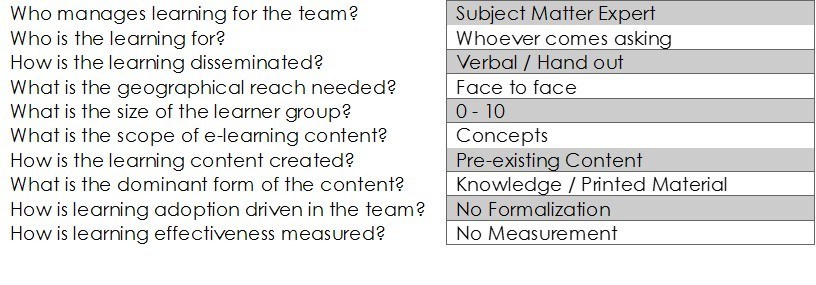 Learning System Requirements
Learning System Requirements
 In the Solo Stage, there is no real need for a formal learning system unless the Subject Matter Expert is planning to translate his knowledge into something more permanent. In such a case, the only requirements they would have is a repository to store the learning content and a way to share the content.
In the Solo Stage, there is no real need for a formal learning system unless the Subject Matter Expert is planning to translate his knowledge into something more permanent. In such a case, the only requirements they would have is a repository to store the learning content and a way to share the content.
Instead of an LMS, you should consider using Google Drive, OneDrive, DropBox or a similar file sharing service at this stage. Alternatively, you could create a course on a MOOC like Coursera or Udemy to host and share your content.
2. Startup Learning Team Requirements
In the Startup Stage, the organization relies on its managers to train their own teams. This is typically the case when the organization is in the startup stage or is composed of small teams. The main learning objective for the learners is to get familiar with the company’s products and sales pitches. A lot of the learning happens on-the-job, and the quality of training depends on the quality of the managers.
Stage Indicators
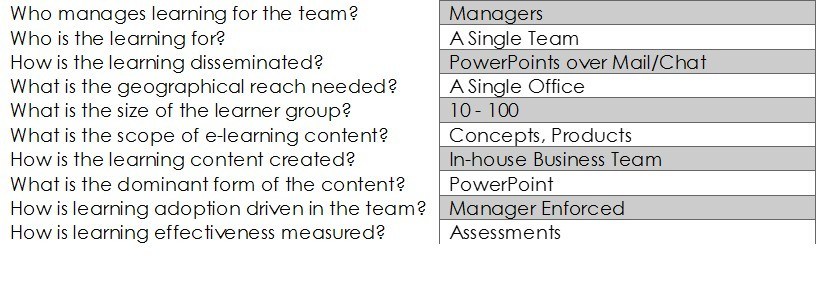 Learning System Requirements
Learning System Requirements

In the Startup Stage, the requirement is for a low-cost system that can be handled by the manager himself. Most of the content that needs to be disseminated is already available as sales pitches and planning documents. The requirements, in this case, are a repository to store the content, a way to share it, a system to check whether the learners have viewed the content, a way to make the whole experience more engaging, some basic assessments and above all, a method to prevent download or onward-sharing of the often-proprietary content. In case the team operates in the field, you might also require mobile learning functionalities.
For this stage, you should try out a lite LMS like QuoDeck Express, TalentLMS or ProProfs.
3. Standard Learning Team Requirements
In the Standard Stage, the organization takes on the responsibility to scale up all its employees. The organization typically has a dedicated HR team, who explore need gaps and plan and conduct learning sessions to plug them. Leading with classroom sessions, most organizations typically look to add in eLearning to standardize the content and dissemination approach as well as reduce costs.
Stage Indicators
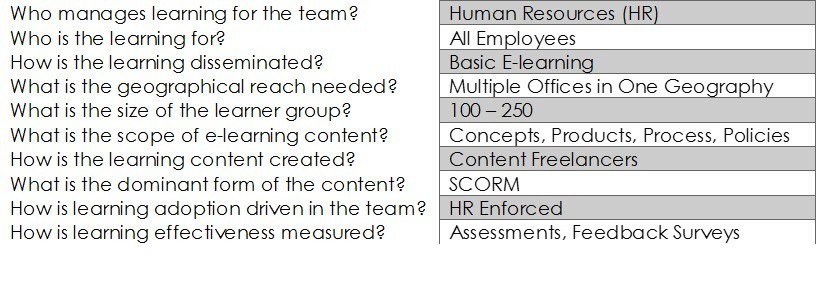 Learning System Requirements
Learning System Requirements

The Standard Stage is when the company is most susceptible to LMS overkill. Given the mandate to acquire a new enterprise system, it is but natural for the team to go for the "best" instead of the "most appropriate". LMSs tend to get evaluated on the number of features they offer, rather than what is really required by the organization.
Ideally, the focus should ideally be on creating high-quality interactive content on tools like Articulate and Captivate. The LMS is required largely for structured dissemination.
At this stage, it is preferable to go for a cloud-based mobile learning system with a lower technical learning curve. Ideal candidates for this are LMSs like Canvas, Docebo, and Litmos.
4. Seasoned Learning Team Requirements
In the Seasoned Stage, the organization starts a decentralization process due to the increase in its scale of operations. Each team has dedicated HR managers who take on the responsibility to scale up the employees in their team. There is a central, dedicated learning team, who oversee and authorize learning activities.
Stage Indicators
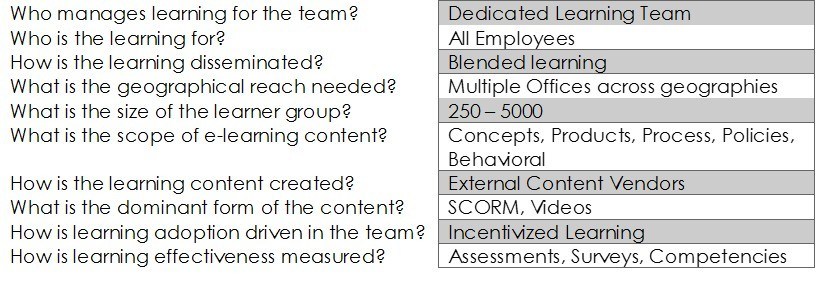 Learning System Requirements
Learning System Requirements

The Seasoned Stage is where the organization should look to acquire a full-fledged LMS. However, the key at this stage goes beyond the LMS features themselves. The ongoing learning management for the organization requires many offline processes which are the mainstay of the learning team.
Mapping of the organization, arranging them into cohorts and setting up aspects like escalation matrices, social networks, etc. require close coordination between the learning team, IT, and business units. Tracking of offline activities requires strong processes driving such activities and social learning requires tight moderation.
At this stage, it is advisable to go for a full-featured LMS like Moodle, Saba, Blackboard, QuoDeck Enterprise, CornerStone On Demand, etc.
5. Scaled Learning Team Requirements
In the Scaled Stage, the organization has learning as a business function. Beyond training its own employees, the learning team of the organization takes on the responsibility of training the employees of its company’s ecosystem (vendors, partners, distributors) and its consumers too.
Stage Indicators
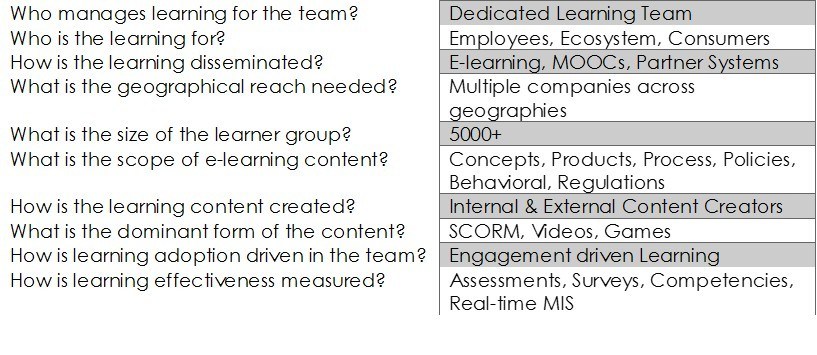 Learning System Requirements
Learning System Requirements

In the Scaled Stage, the organization extends its enterprise LMS with multiple microlearning platforms. These platforms get deployed for differing purposes and are managed by the business teams once set up.
Advanced analytics become a significant component of learning management in this stage. Being a business function, learning at this stage becomes strongly MIS driven, with roll-up reports and integration with Business Intelligence systems.
This stage typically requires an on-premise deployment of a full-featured LMS as in the Seasoned Stage and multiple cloud-based micro-platforms as in the Startup Stage.
Conclusion
Given the hundreds of choices available when picking an LMS, it is undoubtedly difficult to be sure of the one you choose. Be careful that you do not end up investing in a system that is more expensive than what you need to afford, and one that offers features that sound impressive but in reality, add little tangible value to your specific needs. When in doubt, err on the side of caution and start simple.
And remember; ultimately, the LMS is just the technology. Your learning architecture, Instructional Design, content quality, and adoption drives are equally important in proving the difference between a successful implementation and an LMS overkill.


 Learning System Requirements
Learning System Requirements Learning System Requirements
Learning System Requirements Learning System Requirements
Learning System Requirements Learning System Requirements
Learning System Requirements Learning System Requirements
Learning System Requirements







